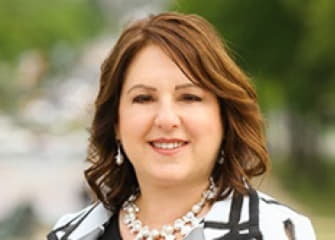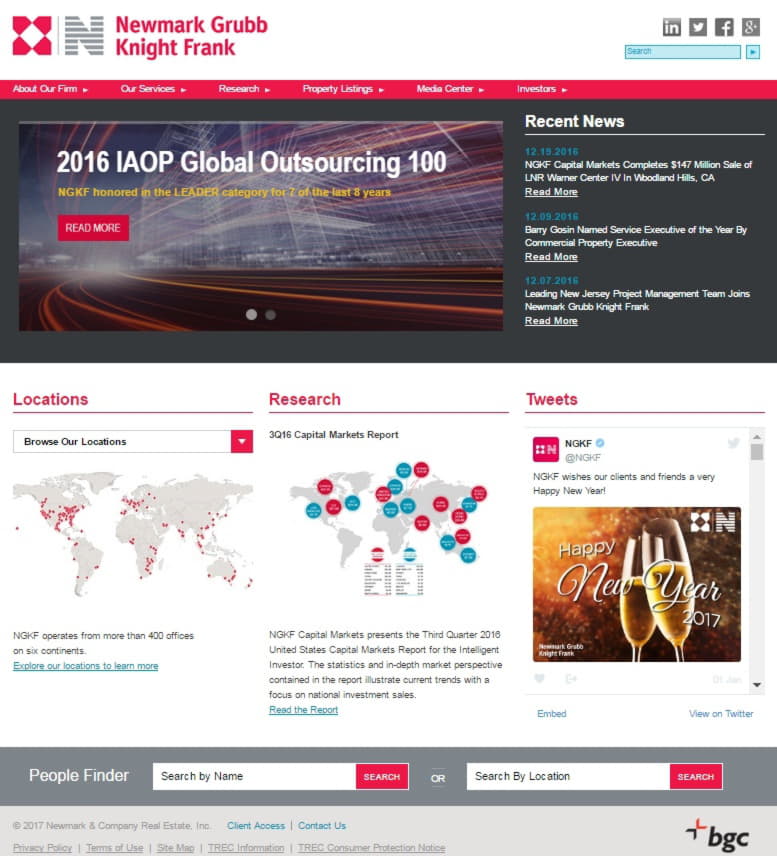
Francine Griesing
Effective, sophisticated representation centered on Philadelphia’s diverse legal needs
Click here for Part I, Part II, Part IV & Part V
Francine Griesing is the founder and Managing Member of Griesing Law, a law firm based in Philadelphia. Founded in 2010, Griesing Law provides comprehensive legal services to the region’s leading government, nonprofit, and for-profit organizations—including Fortune 500 companies. The firm’s services encompass practice areas ranging from employment and business transactions to government and regulatory affairs to intellectual property, higher education, telecommunications, real estate, and much more. In 2013, Griesing Law received the annual Law Firm MVP Award from the National Association of Minority and Women Owned Law Firms. The following year, the firm was selected as SmartCEO Magazine’s Philadelphia Law Firm of the Year.
Francine Griesing spoke with Jeff Mack, of Newmark Grubb Knight Frank, for this interview.
JEFF MACK: Griesing Law is known as a prominent woman-owned business in Philadelphia, and many organizations look to follow your example. Can you tell us about the new consulting business you’ve launched?
FRANCINE GRIESING: Besides the law, we’re involved in some other different kinds of business activities. Based on our success as a law firm, we started to find that so many people, particularly women and minorities, who wanted to start businesses or grow businesses were coming to us for advice. They wanted advice about how we grew from seven clients to 300 clients, how we grew from a small team to a mid-sized team, and the like. So, we’ve launched, in a soft launch kind of way, this consulting business that’s separate from the law firm. A few of us are involved in it—Jessica and I founded it and my daughter Emily is principally running it.
Essentially, our business helps people start and grow businesses. We thought that our principal client base would be women, but the fact of the matter is that we have actually been approached by a lot of men for our services. The services vary widely depending on what the prospect or potential client needs, but principally we’re helping people put systems in place to establish and grow their business. We do a lot of work in the branding, marketing, and social media space for small or emerging businesses. For one of our potential clients, we’ve just been asked to do a proposal on teaching a small law firm how to build its business. It’s quite a wide array of people who are approaching us, and we’re finding that the client base is broader than we anticipated.
Q. When did your interest in law begin?
A. My interest in becoming a lawyer and being an advocate probably started when I could speak. What I mean by that is I have an interesting background that most people don’t know about, even if they think they know me.
I’m the child of two immigrants. My mother came to the United States when she was three years old, from the eastern part of Poland near Russia, from a place called Bialystok, which is where bialys were invented. A Bialy is kind of a flat, skinny bagel, in the simplest terms. My father was from a more remote location, but in that part of Poland as well. He didn’t come to the United States until after World War II. He was a Holocaust survivor.
Both of my parents are gone now. Growing up in a home with that kind of situation, my parents weren’t particularly educated. Neither one of them went to college. In fact, my father had an eighth grade education. We really learned a lot from them about fairness and justice. It’s probably not a coincidence that my only sibling, my brother, is a lawyer in New York, and a criminal defense lawyer at that.
I was told from my father, all the time, that I was always you know advancing arguments in favor of whatever I thought was right or wrong. My father nicknamed me “the judge” when I was probably five years old, even though I’m not a judge, obviously.
I decided I was going to law school when I was about eight or nine years old. Some of that is because my family labeled me “the judge” and clearly thought that that’s what I should do, but the other thing is because my parents didn’t have opportunities, because they were immigrant Jews from Eastern Europe with limited opportunity, and often great hardship, they had this very narrow view about what their children should do. It was a pretty short list, and lawyer and doctor were at the top of it. I do not have much of a taste for blood, nor did my brother, so we both ended up going to law school. I remember knowing in a very young age that was what was expected, and that suited my nature because I liked to write and speak, so off I went, eventually.
Q. What did your parents think of you having your own firm?
A. My father only passed away last summer. When my father passed away, I’d been a lawyer for 34 years, and my firm had been in business over five years, so my father was fully aware of what I was doing. My mother passed away before I started my firm, but my father understood what I was doing and amazingly, for someone who had an eighth grade education, my father understood my business perhaps better than anyone did or does. If I would go see him on a Sunday and he’d be watching the Phillies—he loved to watch baseball—he would turn the game down or make the volume lower and he would start asking me questions: “So, how’s the business going? How’s Jessica—what’s going on with her daughter? Did you meet with any new clients this week?”
One of the things that really exemplified how much he understood what I was doing and valued what I was doing is that a few weeks before my father passed away, I had an opportunity to participate in an elite program very similar to the Goldman Sachs program that’s run by CVS, where they pick about 10 people from around the country—women-owned firms—and bring you to Rhode Island, which is where CVS is located, to help you build your business, if you’re a diverse-owned business. My father wasn’t doing all that well at the time I got the invitation to do the program, but when my father passed away I found a little piece of paper on his night table on which he had written “CVS – Rhode Island.” He had written it down because I told him on the phone that I was going to Rhode Island for CVS. So, yes, he fully appreciated what I was accomplishing and he was very proud of it.
Connect with Francine on LinkedIn
Sponsored By:
ABOUT NEWMARK GRUBB KNIGHT FRANK
Newmark Grubb Knight Frank (NGKF) is one of the world's leading commercial real estate advisory firms. Together with London-based partner Knight Frank and independently-owned offices, NGKF’s 12,800 professionals operate from more than 370 offices in established and emerging property markets on six continents.
With roots dating back to 1929, NGKF’s strong foundation makes it one of the most trusted names in commercial real estate. NGKF’s full-service platform comprises BGC’s real estate services segment, offering commercial real estate tenants, landlords, investors and developers a wide range of services including leasing; capital markets services, including investment sales, debt placement, appraisal, and valuation services; commercial mortgage brokerage services; as well as corporate advisory services, consulting, project and development management, and property and corporate facilities management services. For further information, visit www.ngkf.com.
NGKF is a part of BGC Partners, Inc., a leading global brokerage company servicing the financial and real estate markets. BGC’s common stock trades on the NASDAQ Global Select Market under the ticker symbol (NASDAQ: BGCP). BGC also has an outstanding bond issuance of Senior Notes due June 15, 2042, which trade on the New York Stock Exchange under the symbol (NYSE: BGCA). BGC Partners is led by Chairman and Chief Executive Officer Howard W. Lutnick. For more information, please visit www.bgcpartners.com.


Edwin Warfield, CEO of citybizlist, conducts the CEO Interviews.
If you're interested in reaching CEOs, please contact edwin.warfield@citybuzz.co
Connect on LinkedIn










